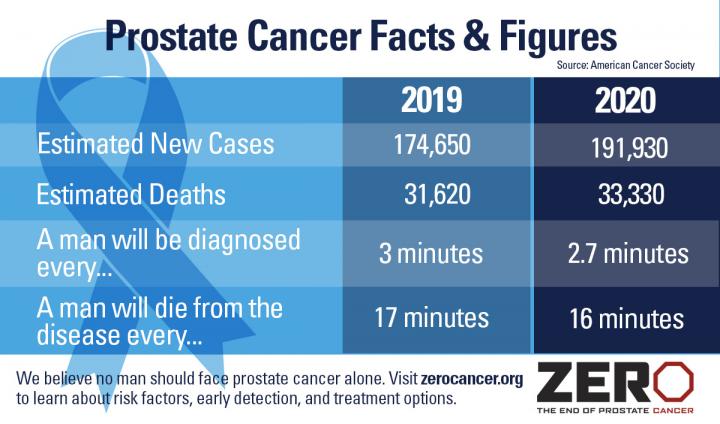2020 prostate cancer death tolls to be highest in two decades

Credit: ZERO – The End of Prostate Cancer/Mariano LIm
WASHINGTON, D.C. – Despite most cancers seeing a drop in deaths, prostate cancer deaths are on the rise in the U.S. New reporting from the American Cancer Society shows that in 2020, the number of men who will die from prostate cancer will hit a record high over the last two decades, with an increase of 5 percent since just last year.
The annual report – Cancer Facts and Figures – was released earlier today, and states that disease reductions “halted” for prostate cancer. Other troubling findings include a prediction that in 2020, prostate cancer will receive the most diagnoses among male cancers, with 21 percent of new cancer cases being prostate-related, compared to the next highest, lung and bronchus, at only 13 percent. Of those diagnosed with prostate cancer, 10 percent are expected to pass away from the disease.
“These statistics are unacceptable and show the urgency for men to get tested early, given the high likelihood of men developing prostate cancer during their lifetime,” said ZERO CEO, Jamie Bearse. “The 2020 Cancer Facts and Figures report says that screening only ‘probably’ reduces mortality rates for prostate cancer. This irresponsible claim made in the report and by opponents of the PSA test is simply untrue. Early detection saves lives, but unfortunately, decades of mixed messaging about the PSA test have left both doctors and men confused about the importance of testing. As a result, fewer men are taking initiative regarding their prostate health, which is directly contributing to more deaths from prostate cancer year over year.”
In 2020, men will still be diagnosed at a rate of 1 in 9 men. This makes prostate cancer the most likely cancer diagnosis among men, followed by lung and bronchus at a rate of 1 in 15.
“The risk of death from prostate cancer is highest among men who develop metastatic and/or castrate disease,” said ZERO Medical Advisory Board Member, Dr. Kelvin Moses, an associate professor of urology at Vanderbilt University. “There have been multiple treatments approved in the metastatic and castrate-resistant space in the past decade, and yet the mortality rate from prostate cancer has plateaued, and possibly increased in recent years. The prevailing paradigm among the opponents of prostate cancer screening has been that the significant decline in prostate cancer mortality in the so-called PSA era was also attributed to ‘better treatment.’ Yet the proliferation of treatments specifically directed to late-stage disease has not made a dent in mortality rates. This fact, along with the continued decrease in mortality in other screened cancers (lung and colorectal), further proves the utility of PSA screening in appropriately selected patients.”
Rising prostate cancer deaths correlate to medical bodies — such as the U.S. Preventive Services Task Force — discouraging the lifesaving PSA test. When caught early, prostate cancer has a 99 percent chance of survival; this is three times higher than when prostate cancer is found in an advanced stage, which has only a 30 percent rate of survival.
“When I found out I had prostate cancer, I just wanted to live,” said Jeffrey Wilde, a prostate cancer survivor in North Carolina. “I’m here today because my cancer was caught early. We need to educate more men about this disease, and why early testing is crucial to survival. The fact that I’m still here today is proof.”
ZERO recommends that doctors and men follow the National Comprehensive Cancer Network Guidelines® for Prostate Cancer Early Detection, which calls for a discussion of the risks and benefits of testing for men beginning at age 45 if they fall into any of these categories:
- -Family history of prostate cancer
-African American ancestry
-History of prostate disease
-Family history of the BRCA 1 or 2 gene mutations
-Military veterans
The report and its data are a product of the American Cancer Society from National Cancer Institute Surveillance, Epidemiology, and End Results Program North American Association of Central Cancer Registries, and the Centers for Disease Control.
###
ABOUT ZERO – THE END OF PROSTATE CANCER
ZERO — The End of Prostate Cancer is the leading national nonprofit with the mission to end prostate cancer. ZERO advances research, improves the lives of men and families, and inspires action. We’re building Generation ZERO, the first generation of men free from prostate cancer, through our national run/walk series, education and patient support programs, and grassroots advocacy. ZERO is a 501(c)(3) philanthropic organization recognized with four out of four stars by Charity Navigator, accredited by the Better Business Bureau, with regional chapters across the country. We dedicate 86 cents of every dollar to research and programs. For more information, visit zerocancer.org.
Media Contact
Ilana Ostrin
[email protected]
202-657-2249




